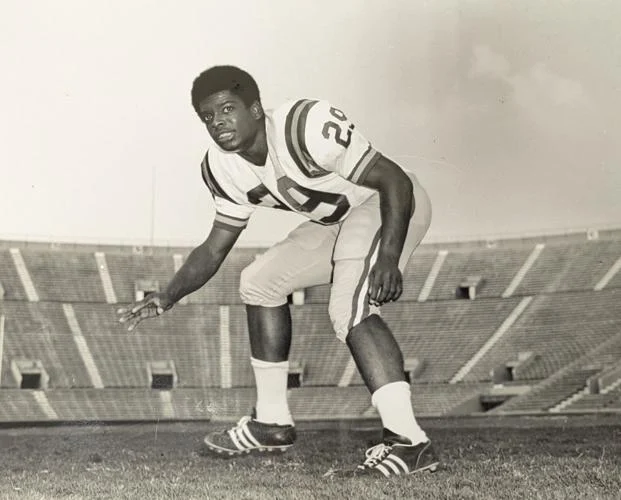Mike Williams still sports his signature smile, even if he can’t run as fast as he used to. The 70-year-old former Covington High and LSU standout spent nine seasons in the NFL, but his favorite memories from playing at the highest level remain vivid.
“The thing I remember most is spending time hanging with the guys,” Williams said. “I just like being around people. That was the main thing.”

So who is Mike Williams?
Simply put, he’s someone who enjoys helping people and injecting humor into conversations. More specifically, he had a historic career at LSU as one of the first two players to break the football color barrier and the first Black player to earn All-American status. Despite his achievements, he preferred staying out of the spotlight, valuing time with family and friends.
“He had a wonderful career at LSU and in the NFL,” his daughter, Michelle Williams, said. “Off the field, he’s very humble and generous about giving back to the community. He doesn’t like a lot of attention. He does it behind the scenes. That’s just his way.”
Even with his efforts to remain low-key, his athletic prowess ensured he was well-known. People still recognize and greet him warmly when they see him outside.
“I played baseball and football, but when I picked up a football, that was it. Football just came naturally. As I got bigger, I learned to play a little better,” Williams said. He began playing football in junior high, and by his senior year at Covington High, he finished third in the state in rushing yards and was a top defensive back prospect.
Williams chose to attend LSU, where he became a three-time All-SEC defensive back and an All-American as a senior in 1974. He started from his first varsity game in 1972, recording a career-best 66 tackles and four interceptions as a sophomore.
“He is an extremely coachable and dedicated young man,” then LSU assistant coach Don “Scooter” Purvis told The Advocate. “As a freshman, he showed reaction quickness as good as any back I’ve seen, including (All-American Tommy) Casanova.”
In 1973, Williams tallied 50 tackles and three interceptions, prompting Advocate sports writer Joe Planas to write that Williams “plays the corner like he owns the whole block.” During his senior season, he switched from cornerback to safety, recording 63 tackles and two fumble recoveries.
Williams was the 22nd overall pick in the 1975 NFL draft by the San Diego Chargers, becoming the first and only St. Tammany Parish-based player to be a first-round NFL pick. He started over 100 games at cornerback for the Chargers before finishing his career with the Los Angeles Rams in 1983.
“He’s as good at covering passes as anyone I’ve ever seen,” then Chargers coach Tommy Prothro said. Williams agreed, particularly about his toughness.
“I loved hitting somebody, even the big backs,” he said. “I wanted to hit, and they wanted to run over you. I just wanted to compete.”
Despite his consistent 4.5 40-yard dash, injuries began to catch up with him, leading to his retirement.
“I just decided that it was time to let it go,” Williams said. “Pain is a rough thing when you’re playing in the NFL. That pain started to bother me, so I started to think about doing something else.”
Coaching was not in the cards for Williams. “I never wanted to coach, to tell you the truth,” he said. “All I wanted to do was be a player. Helping the other guys was the most important thing about playing football to me.”
After retiring from the NFL, Williams returned to Covington in the early 1980s, taking time off before working nearly a decade with the St. Tammany Parish Sheriff’s Office and then retiring for good.
He remains a dedicated LSU fan, with memorabilia highlighting his home, including a photo that hung in the LSU Fieldhouse for years.
“If you’re not an LSU fan, something is wrong with you,” Williams said, flashing his signature grin.
For nearly a decade, Williams has been a member of Tree of Hope, an organization that gives back to the community.
Perhaps his greatest legacy is the commitment to community he passed on to his children, who volunteer and coach in local youth recreation groups, sharing their father’s love for sports.
“Covington has always been home,” Michelle said. “(Dad) likes being in the community and seeing old friends. He just likes being home. To me, he is just Dad, but then we would go out, and people would want autographs and things like that, so we took a lot of pride in that. But when he is home, he’s just Dad.”
Williams advises young players to prioritize education alongside their athletic dreams.
“Make sure that you get your education because you have to do something after playing football,” he said. “My goal was to get an education.”
Michelle noted that her father’s legacy is the importance of giving back to the community.
“You kind of watch and pick it up. The beauty of giving back is the actual act, so that’s the reward. The joy comes from actually being there and helping, and that’s the part that he’s passed down over the years,” she said.
